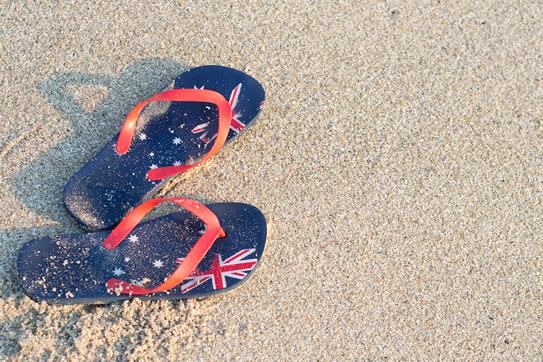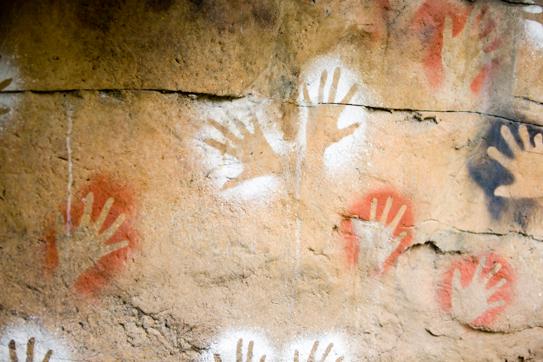
True Blue
Australian Slang’s Alive and Well
27-01-2018
Dinky-di cobbers won’t come a gutser or have a blue about how the Dictionary of ’Strayn is as broad as the sunburnt country.
Even Dr Rob Pensalfini, a senior lecturer in linguistics and drama at the University of Queensland, believes Australian slang is as motley as Australia itself – and he’s as cunning as a dunny rat.
“There’s heaps of diversity,” he said. “If you look at Australian English, it’s got heaps of diverse input. And it’s changing all the time.”
Australian English is based on Cockney and Irish, Rob explains. “What we had in Britain was essentially class war, and so whoever was being shipped out were the poor Londoners and the Irish,” he said.
“They give us our basic pronunciation and a lot of the terms we use now.”
So many of the phrases we think of as typically Australian are in fact common British phrases that have fallen out of use.
“Crikey”, for instance, is a euphemism for “Christ”, “tucker” (food) comes from the Irish, while “strewth” is an abbreviated Elizabethan oath first recorded by Shakespeare.
It didn’t take long, however, for Australian English to mutate into something original.

Poetry Paves the Way
Rob traces the development of a uniquely Australian idiom back to some of our earliest popular literature.
“If you go back and look at early bush poetry, you can see there was a certain way of expressing yourself that was not Irish, was not English,” he said. “There was a voice there that was distinct.”
Australian language is often recorded – and explored – in poetry. Kent MacCarter, author of three collections of poems, In the Hungry Middle of Here, Ribosome Spreadsheet and Sputnik’s Cousin, and the editor of Joyful Strains: Making Australia Home, regularly collects new slang for his work.
An American expat of 11 years, Kent believes the Australian idiom has changed him forever. “I’m definitely attuned to it, and I use it in my work, for sure,” he said.
“I do find myself saying these things without planning it, so they’ve certainly infiltrated. If I were to leave Australia and never come back, it’s definitely there for good.”

A Yank in Oz
Kent wasn’t always as attuned to Australian-isms, however. On his third day in the country, he was calling potential flatmates, trying to find somewhere to live.
“I was talking to a young guy, and trying to arrange a time, and he just kept telling me to ‘come by this arvo, mate’,” he recalled.
“I didn’t want to sound like a complete moron, so I tried to recast the question: This evening? In a couple of hours? He just kept saying ‘this arvo, mate’. I just had no clue as to what this meant.”
Unable to translate “arvo”, Kent decided to wing it and waited 90 minutes before just rocking up. “By that time it was about 1 or 2pm, so it was officially ‘arvo’,” he laughed.

Melting Pot of Many Countries
Immigrants such as Kent provide some of the most fertile ground for creative Australian language to grow.
One of the most interesting developments in our nation’s idiom is “New-Australian English”, a way of speaking that developed in Greek and Italian- Australian communities that was popularised in television programs such as Acropolis Now and Fat Pizza.
“[New-Australian English] is something that emerged in the 60s and 70s in urban Sydney and Melbourne, particularly among first-generation people of a Mediterranean background – people like me,” Rob explained.
“You get this particular way of talking, and it has its own cadence, and it has its own words, like the way you say ‘mate’. It’s this classically Aussie term, which is pronounced in this variety more like ‘might’.”
What interests Rob about New-Australian English is that it’s not strictly confined to its cultural group. Instead, it has begun to enter the culture at large. He says the local hip-hop community has enthusiastically adopted it.
“If you listen to a lot of hip-hop, the lyrics have the prosody and the sound of New-Australian English,” he said.
Aboriginal Words Enhance English
It is not only new Australians who influence contemporary language: the First Australians’ traditional dialects are also having an impact.
Indigenous slang such as “deadly” (fantastic) or “mob” (identifies a group of Aboriginal or Torres Strait Islander people with a particular place or country) are now commonly heard terms throughout the country.
So it seems “Strayn” is in rude health. It has even convinced some Americans to change their ways. “I’ve thrown out ‘faucet’ for ‘tap’, for example,” said Kent. “It’s weird what falls away and what sticks.”
A Quick Guide to Speaking Aussie
arvo: short for afternoon, as in “see you this arvo”
bikkie: short for biscuit or cookie, usually served with tea – like the Aussie favourite Anzac biscuits
blue: a redhead; a barely cooked steak
cobber: a friend or mate
digger: an Australian or New Zealand soldier
dill: a fool
dinkum or dinky di: honest or genuine, as in “that’s dinky-di, I swear that’s fair dinkum”
esky: a portable cooler
grommet: a young surfer
grouse: good, excellent (specifically from Melbourne)
no worries: you’re welcome
ratbag: a disreputable individual
strides: trousers
stunned mullet: someone who looks shocked
tucker: food
The Lucky Country: Australia (of course)
yabber: to talk
This story was originally published on 02/02/16
Read Time
What others are reading
More to enjoy